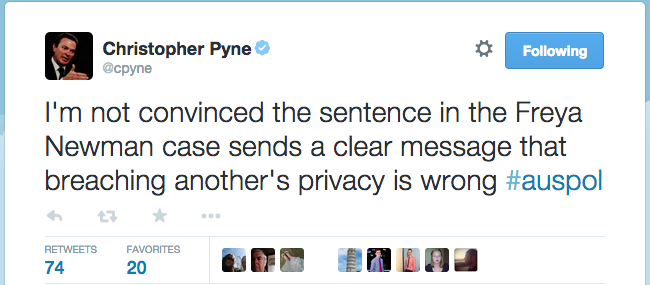Christopher Pyne is not having a good week on social media.
First, he thought it might be fun start to a petition asking the mean old ABC not to close operations in his home state of South Australia – never mind it was doing so because of budget cuts passed by the cabinet he’s a member.
People didn’t react too kindly.
Now, Pyne has used his position as a Minister in the Australian Government to hit out at a Local Court magistrate and a young whistleblower.
Earlier this morning Freya Newman, who accessed the student records of Frances Abbott and helped make her secret $60,000 scholarship public, was handed a Section 10 by Magistrate Teresa O’Sullivan, meaning she was found to have breached the law but will not have a conviction recorded, provided she remains of good behaviour for two years.
It was a good result for Ms Newman, but not so far as Pyne was concerned.

The Minister’s concerns seem a little overstated given the facts of the case.
If Pyne had been in attendance at today’s sentencing, and earlier court dates, he would have been aware that police prosecutors agreed Newman’s offending was at the lower end of the scale.
He would have also been aware that previous (and in most cases more serious) matters involving breaches of Section 308(H) – which prohibits the unauthorised accessing of restricted data held in a computer – have seen fairly low-level sentences handed out.
These included instances of jealous police officers accessing restricted internal police databases, in one case to dig up details on who owned the car parked outside a lover’s house. Unlike Newman’s case, this breach was clearly in the pursuit of self-interest.
In explaining her reasons for granting a Section 10, O’Sullivan pointed to the case of a man who sold 20 ecstasy pills. It was a serious charge and, again, a crime committed by someone aware they would be breaching the law and doing so for reasons of personal profit.
However, the defendant’s good character and strong future prospects meant they were granted a Section 10, a sentence upheld on appeal.
Freya Newman wasn’t selling drugs. She wasn’t trying to profit from her actions. She was seeking to expose a matter of substantial public interest.
In her case, the police argued that despite being a low level offence, a conviction still needed to be recorded. But O’Sullivan pointed to the ecstasy supply case and judged a two-year good behaviour bond fulfilled the court’s responsibility to deter others from committing the same offence.
Anyone who saw the media pack huddling around Newman as she left the court, and heard her lawyers discuss the pressure the case has put on her 21-year-old’s shoulders, would surely be inclined to believe a strong deterrent has been set.
To put it another way, the chilling effect of prosecuting this particular whistleblower will work. Newman did not know it was illegal to use a co-worker’s log in to access a database. She, and a whole lot more people, sure as hell know now.
Public prosecutions like these send a broader message too, targeted at those currently sitting on a pile of potentially devastating documents: go public and someone will likely find a way to get you.
Evidently, Minister Pyne believes his legal insight is superior to O’Sullivan’s, and that he is sufficiently across both the precedents set in other cases and the ins and outs of the Frances Abbott affair to offer his humble legal opinion.
But the good folk of twitter once again were a little underwhelmed.


Given the police prosecutors now have 28 days to launch an appeal, it might be good for Minister Pyne to sit on his legal opinions for a little longer, lest anyone get the impression the executive branch are attempting to tip the scales of justice against Freya Newman.
Contacted for comment, a spokesperson for Pyne said:
“The Minister’s comment is self-explanatory and represents his personal view that he is entirely within his rights to express.”
Fair enough. And we look forward to the Minister’s future comments on all local court cases being held at the Downing Centre in Sydney, as well as his presumably impending stand against the government’s data retention laws.

The really dangerous precedent set by the prosecution of Freya Newman is that it reveals the shortcomings in whistleblower protections laws, and the need for stronger public interest exemptions in privacy law (Britain, for instance, has stricter laws but broader exemptions).
But don’t take our word for it. We’ve published O’Sullivan’s full judgement here.
Having tracked this case with intense interest for the last three months, it doesn’t make us quite as anxious as Minister Pyne.
Donate To New Matilda
New Matilda is a small, independent media outlet. We survive through reader contributions, and never losing a lawsuit. If you got something from this article, giving something back helps us to continue speaking truth to power. Every little bit counts.



